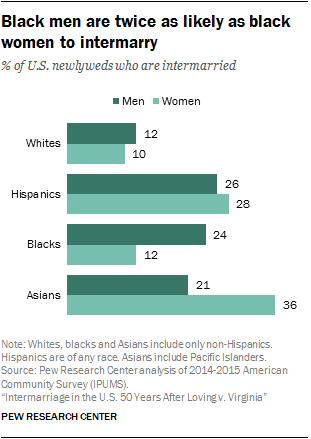The Last Frontier of Discrimination
How racial enlightenment ironically resulted in greater disadvantage for certain groups
Since the civil rights movement, interracial marriage approval rates skyrocketed from effectively zero to an overwhelming majority. This development should be applauded as a sign of a more race-tolerant society and because it presents suitors more choice in the field of eligible mates. Since marriage can be taken to be the most sacred of societal relationships, racism in the public eye has been at least ~87% addressed.

With one form of racism more or less expelled, another more onerous version takes its place: a discrimination that is more innate and therefore difficult to expel. This version is predicted by science: by natural selection and theories of sexual fitness. That is to say preference is hardwired into our brains. Desirability among races is clearly seen in statistics aggregated by OkCupid, the frivolous online dating service turned statistical dream. It shows Black women performing worse than average when rated by each racial segment of men, including Black men. The data show the inherent discriminatory nature of people, whether it is conscious or not. Although ~87% of people approve of interracial marriage when asked in a survey, approval does not entirely lead to action.

These racial preferences are not isolated to OkCupid scores. They materialize in a significant skew in interracial marriage rates. As the OkCupid data show, Black women are less desired than Black men by non-Blacks. The result is the following: Black men marry outside of their race far more frequently than Black women. Based on a Pew study, 15% fewer Black men are available for Black women because Black men married non-Black women. There are about the same amount of men and women in each race category, meaning if current trends sustain, 15% of Black women will never be married, quadrupling the normal rate.
% of newlyweds married to someone of a different race/ethnicity

You can see this trend playing out already. In 1950, before interracial marriages were in vogue, we notice that the never-married rate for Black women was lower by 6 percentage points than the rate for Black men, which is similar to the spread seen between White men and women. It is usual for men to be more never married at any given age as they marry later; the opposite is true for women. Then as interracial marriages became more accepted, and as Black men became less available to Black women, the never-married rate for Black women increased from a 6 percentage point advantage to a 6 percentage point disadvantage today. During the same period, the spread between white men and women stayed static. Having fewer unmarried men than unmarried women at the same age creates difficulties for women to ever be married. A 12 percentage point shift is monumental over a 65 year period. Such a move changes a generation’s values, aspirations, expectations and therefore happiness. None of this should be particularly surprising as popular media consistently portray one interracial relationship more frequently than the other (the recently released House of Cards season provides an easy example). What is surprising is how clearly it is transcribed in hard data, and the magnitude of these skews.
Never Married Rate

Mixed couples tend to be higher income and higher educated, meaning not only do Black women face fewer Black men, but a less educated and less affluent group.
An even greater issue than that this discrimination exists is that intelligent people who would otherwise abhor any form of discrimination do not seem to have a problem with these preferences because they are so innate, biologically driven or compounded by the media. These people are the farthest thing from traditional racists and have impeccable moral standing. The very thought that their own subconscious can be described as discriminatory bothers them. One counter-argument made by intelligent people is that preference is not the same as discrimination. That is wrong. Any discrimination can "flipped" and stated as a preference. A second argument is that since intermarriage statistics are strong, Black women have an “equality of opportunity”, and it is up to them to seek interracial marriages. Yet as OkCupid statistics show, this is a demand side problem and it is a difficult argument to assert Black men make better mates than Black women in modern society.
Discrimination is wrong and 80+% of the people know it. Today’s discrimination is no longer about segregated schools and segregated busses. It is more nuanced and involves things that we innately think, and subconsciously gravitate towards. It is something we probably don’t even realize is driving the decisions we make. We should rejoice that so much has changed for the better in the last few decades for the better yet we must not become complacent.
The barriers going forward are more difficult to break down because preference is both engrained in our biology and effected by the media and popular culture. Perhaps we don't treat certain races badly on average, and we don't treat certain genders poorly on average, but we are still biased against some cross-sections of gender and race. But just as we overcame xenophobia, the result of tribal attitudes, we need to overcome centuries of evolutionary bias. I cannot imagine a world without innate discrimination but neither could the young baby boomer believe the 21st century free world would be led by a Black man. So I have confidence that we will continue to advance socially to create the world we want to live in. And it is up to every one of us to recognize our inherent bias and change our behaviors, one person at a time.